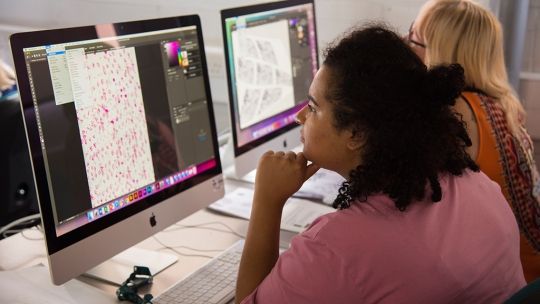BSc (Hons) Computing
- Study Mode: Full Time
- Location: High Wycombe
- Duration: Three or Four Years
- Start Date: September 2024
From analysis and design, through to database theory, networking, object-orientated programming, mobile computing and web-development, this specialism offers a strong understanding of current computing applications, design and development.
You'll learn about all crucial aspects of computer system and software development including analysis, design, development, testing and maintenance. You'll study a full-range of system development skills, including maintenance and quality assurance.
Why study this subject?
From the latest developments in industry to cutting-edge applications you will be able to learn how computer theory and web development can work hand-in-hand to provide an exciting and fast paced career.
Gain experience in the technical skills you need to start a challenging and dynamic career. You will have access to fully equipped computing facilities and be taught by expert lecturers providing high quality teaching and support in a friendly, motivated learning environment. You’ll also benefit from our partnership with Amazon where we run its AWS Academy, allowing you to gain industry standard knowledge and skills and further enhance your career prospects.
The teaching staff have gone above and beyond to make sure we are confident and equipped when entering the industry. This has been achieved by providing us with excellent real-world scenarios that prepare us for any future endeavours within the computing world.Anum Hanif

Why study at Buckinghamshire New University?
Give yourself an edge in the graduate market by studying a hands-on degree. You’ll have the opportunity to learn the latest industry knowledge alongside working with industry professionals to gain invaluable practical experience whilst building your network base. Studying our programme allows you to learn fundamental vocational skills such as analysis and design, programming and testing, networking and security, software engineering and databases.
We are a student focused and employer-led university which means that you are at the forefront of all that we do. We provide you with a thorough understanding in computing and systems, web development and programming and our modules are designed to reflect the latest issues in the constantly changing area of computing to ensure you graduate ready for employment or further postgraduate study.
Not only will you be learning vital information, you will be learning from innovative, forward-thinking and highly motivated expert lecturers. Our lecturers have close industrial links and all work together to ensure that you have the best possible enriched and stimulating learning environment.
To further enhance your education, we invite in guest lectures to share their experience and expertise and host day-long interactive events run by leaders in their field giving you the chance to put your knowledge into action.
Opportunity modules are a key part of the BNU curriculum. You’ll choose modules in both your first and second year from a broad selection in areas such as sustainability, entrepreneurship, creativity, digital skills, personal growth, civic engagement, health & wellbeing and employment. Opportunity modules are designed to enable you to develop outside the traditional boundaries of your discipline and help you to further stand out from the crowd to future employers.
Our specialisms
Buckinghamshire New University gives you the opportunity to choose your specialism for your future career after your experience of the core curriculum in year one. Rather than having to make your big decision before you join us, we introduce you to various specialisms and offer you the flexibility to choose the specialism which leads to your chosen speciality. You can choose between BSc (Hons) Computing and BSc (Hons) Computing with Web Development.
These specialisms are also offered as four-year programmes, including an initial Foundation Year. The Foundation Year will allow you to develop your academic study skills and build confidence in your abilities, identifying your own strengths and development needs for progression onto an undergraduate programme.
What facilities can I use?
We’ve invested in a range of state-of-the-art facilities across our campuses to support your learning. Our computing facilities are packed with the latest industry-standard equipment and software, meaning you can make an easy transition from education into employment. Most of our large computing labs have dual-screen, dual boot (Windows and Linux) systems.
Hands-on experience is what we are all about. We have numerous devices that will provide the basis for various supervised projects you will carry out across the programme. These include but are not limited to Virtual Reality headsets, 3D printers, Raspberry Pi microcomputers, EEG headsets.
Our library is the perfect place to find the resources you need and a quiet place to study, filled with four floors of books, journals, computer suites and study rooms. Or, if you’d rather work off campus, e-Journals and resources are only a few clicks away using our Virtual Learning Environment.
I was very well prepared for work as we had studied a work-based project in the second year which gave me valuable experience and I was also helped with CV writing which helped tremendously when applying for work.Nigel Allen IT & Cloud Services Manager, ATE Enterprises

What will I study?
This programme is founded in software and web technologies with a focus on the technical side of web-based applications and services for working in industries that require expertise in web focused sectors of computing. You will gain an appreciation of the role that web-based computing can have in a range of business and industry contexts. The course provides a balance of theory and practice, providing opportunities to apply knowledge into real projects where possible. You will acquire a wide range of skills and competences such as the ability to think critically about real-world problems. You will be exposed to a variety of computing discipline areas, so that you will then be able to select and apply appropriate principles, theories, best practices and appropriate technologies to address the needs of different business contexts, users, customers and stakeholders.
You will also get opportunities to expand your knowledge both inside and outside of the lecture theatre. Students have previously attended Amazon AWS Forums and visited sites of historical importance, including Bletchley Park, to learn more about the history of computing and how it impacted the world.
You’ll learn alternative architectures for emerging cloud-based technologies. You will also study modules on developing and deploying secure and mobile-ready web applications with backend databases. This will help prepare you for both generic ‘computing’ job markets and more specialised areas that require mobile web-based services. Both these aspects are much sought after by UK and international employers.
You’ll have plenty of opportunities to extend your knowledge in programming and database management. This hands-on course will see you master the art of Java, C# and C++. You’ll cover the full systems implementation cycle, using industry standard tools and techniques including CASE. In year one you will work on developing a range of knowledge and skills to provide you with a solid foundation of the fundamentals of computing. You will look at a range of topics from computer architectures to networking (Cisco), application programming to web development, and user experience to digital technologies. You will also develop technical competency in user-interface and location-sensitive frameworks, industry-standards for secure and robust software engineering, database development, network operation, mobile systems, and information and network security.
You will be able to practice the technology provided by the world cloud leader and gain a 50% discount on Amazon AWS (Cloud Architecture) official certification exam (optional for students). For further information, please contact Dr Rafid Al-Khannak.
How will I be taught and assessed?
We have a strong computing department at the University, with a dedicated team of academics and professionals delivering industry-relevant courses in a suite of well-equipped computer labs. Our lecturers work closely with industry through partnerships or by helping web development and related industries with research, consultancy, technical and managerial inputs. These relationships provide a professional edge to our teaching. They are also a useful source of internship and industry-brief opportunities for our students.
You’ll benefit from small class sizes that give you a chance to develop close working relationships with the tutors and other students. You’ll be taught through a combination of formal lectures, tutorials, practical lab sessions, and seminars. You will also benefit from guest speakers and valuable networking opportunities.
Course assignments reflect real-life problems because we believe that’s the best way to learn – and it’s more fun! Over the years of your course you will be assessed and graded in a multitude of ways to allow you to develop and expand on your abilities and skills.
Assessments for the various modules will mostly take the form of practical coursework, lab tests, shorter written exercises and written exams. However, the main focus will be on testing the practical application of the various concepts and techniques being conveyed.
We also encourage you to gain work experience whilst studying and actively look for clients for your project work, which provide you with the opportunity to develop your skills in a work-base setting.
The course addresses the professional and customer-facing skills that are essential for employment in computing industries. Modules also provide opportunities to prepare for the professional certification programmes of global companies such as Amazon AWS, Microsoft, Oracle, Hewlett-Packard and Cisco. (Full accreditation is via self-funded examinations.)
The range of traditional modules and modern computing topic modules on offer at BNU helped me stand out from the crowd when looking for a role after graduating.Robert Collcott 1st Line Engineer and IT Technician, Focus Networks Ltd

What are the course entry requirements?
A typical offer will require a UCAS tariff score of: 88 - 112 (Full-time) or 32 - 56 (Foundation Year)
UCAS points can be obtained through qualifications such as A levels, T levels, BTEC or an Access to Higher Education course in a relevant subject. Please list all your qualifications on the application form as you will be asked to provide copies when we receive your application.
A minimum of two full A-levels (or equivalent) is required as well as GCSE Maths and English at grade C/4. Every application is considered on an individual basis.
For further details of our international English entry requirements, please visit our international pages.
Applicants who do not meet the minimum requirements for the three-year undergraduate programme, or those who do not feel fully prepared for a degree course, can apply for a four-year programme including a Foundation Year; find out more.
Modules
This provides a guide of the modules that make up your course. You can find more information about how your course is structured on our Academic Advice section.
This course has Opportunity modules.
Opportunity modules are a key part of the BNU curriculum. You’ll choose modules in both your first and second year from a broad selection in areas such as sustainability, entrepreneurship, creativity, digital skills, personal growth, civic engagement, health & wellbeing and employment. Opportunity modules are designed to enable you to develop outside the traditional boundaries of your discipline and help you to further stand out from the crowd to future employers. Find out more.
You must choose 2 x 10 credit Level 4 Opportunity modules from the Opportunity module catalogue.
In addition, you must choose 2 x 10 credit Level 5 Opportunity modules from the Opportunity module catalogue.
What are the tuition fees
Home
-
Home, Academic Year 2024 - 2025: £9,250 per year
International
-
Overseas/International, Academic Year 2024 - 2025: £15,150 per year
What are my career prospects?
Throughout your time with us we’ll support you on the route to your chosen career. We’ll help you to develop crucial skills, encouraging you to become enterprising, employable and good leaders. We also help you find employment after graduation. Have a look at our Careers and Employability pages to find out more.
Being able to contribute to the analysis, design, creation and management of information systems and software, graduates will find a variety of exciting and dynamic career paths open to them.
You will be qualified to work in areas such as:
- Software development
- Systems analysis
- Corporate or Government IT
- Database administration
- Web system development
- System support
- Network engineering
- Research.
You may also enjoy a career in the vibrant and growing area of Mobile and Cloud Computing.
You could also choose to stay on at Buckinghamshire New University and study a postgraduate programme.
Make the most of advice from lecturers, especially in planning assignments. Use the services available, including the Careers and Employability team; they are really helpful especially on input, advice and preparing your CV for employment.Robert Collcott 1st Line Engineer and IT Technician, Focus Networks Ltd

Course leader



- Deputy Head of School (Creative and Digital Industries)
- Associate Professor















